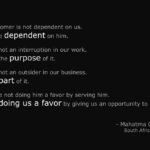My bank recently sent me a notification to let me know that an account that I had with them was declared dormant as there had been no activity on it for the past six months and that to reactivate it, I needed to go into the bank and fill out a form and pay up the reactivation fees. I felt irritation wash over me at this communication and called the help desk where I spoke to a lady who was very quick to let me know that their customer service manager would call me to give me answers.
Given the previous not too pleasant experiences I had gone through with the bank, I politely indicated that I would rather hold and be transferred to the manager as I suspect they may not call me back as promised. After several tries she informed me that the manager would definitely call me. True to form, I received a telephone call a few minutes later from a gentleman who asks for ‘Harriet’. I duly inform him that I am not Harriet and he hangs up surprised. After yet a few more minutes the same gentleman called me and said he is calling from my bank in response to my complaint, upon which I inform him that I am not Harriet and that it is real pity that they do not have the courtesy to find out the proper names of their customers especially those that have registered complaints before they call them up. To cut the long story short, this gentleman went to great lengths to explain to me the security reasons for which they declare accounts dormant, to which I replied I am very happy to know that they take security very seriously and I commend them for having stringent measures in place. However, my main concern is not that the account has been declared dormant, but that nobody had told me about the six months rule. And that if I was aware of it, I would have done something about it. And that it is not in order for me to hear about an account being declared dormant and my having to pay for reactivating it, once it is already done, without my having consented to these terms and conditions. Needless to say my bid to get answers was in vain and I was very politely requested to come into the bank and fill out a reactivation form and that for the month they had waived reactivation fees. My point had gone nowhere, had not been heard and had not been gotten.
What is the moral of the story here? What key element is missing in this communication? What needed to have been said and done to have me the customer appeased? What would have made me less irritable and not inclined to tell this story to a hundred other people, pitting my bank in a very poor light?
The key that unlocks almost all customer complaints and can turn a customer round from a complaining customer to a loyal ambassador is effective listening. In this case, the customer service representatives were extremely keen to notify me of their rules, regulations, security features and all the reasons why the account was declared dormant and fulfilled the criteria for a dormant account. What was missing was the ability to listen to what my complaint was about. What was I aggrieved about, what was I complaining about. They were so busy answering the unasked question. What was key to them was to explain the reasons for dormancy whilst my biggest complaint was lack of effective advance communication.
Now reverse the situation and imagine that the customer service representatives listened to what the heart of my problem was and responded that indeed they can imagine exactly what I must be feeling having an email land in my inbox informing me of something I wasn’t aware about and that indeed this must be an error of omission they haven’t thought of previously to alert customers on joining about the six month rule. They could further have indicated that this is indeed food for thought and that they will most definitely pass on this information to the relevant department and have this communication included in all account opening transactions going forwards. They could also possibly have thanked me for bringing this to their attention and that they would endeavour to have no other customer go through a situation like mine. Then continued to further explain that once an account is dormant one really does need to come into the bank to sort out the matter and that they would request me to let them know when I am coming in so that they can give me their best assistance. How does that sound? The end result of this communication is the exact same end result as the previous communication only without the sour taste left in the customer’s mouth.
Richard Carlson in his award winning book ‘Don’t Sweat the Small Stuff at Work’ talks about seriously listening to customer feedback without being dismissive and defensive. And that if one really listens to what their customer is saying with a receptive and willing attitude, then one can only be successful in business. That we should all be willing to admit that other people can very often see things that we may be too involved in or too routine about that we may not appreciate may be seen from another point of view.
So all that said, what does it take to effectively listen to our customers? Various experts on listening advise on listening intuitively, listening to the body language and unspoken words from the speaker as well as listening to the tone of voice and mood of the speaker and gauging the deeper meaning of the communication coming across. It is said as well that we should listen with our senses. And that for example if one is speaking to us we should imagine the story they are telling and really feel it, thing visually about the picture being painted, hear the sounds of the story being told, actually smell the items being described and reach out and almost physically touch and put your finger to what is being said. If one commits to listening to their customers in this way 90% of the battle is already won. Majority of the customers who complain will feel so much better about being heard and may not even follow through with the complaint. Just the fact that somebody somewhere cares enough to really listen to their point of view, their frustrations and their solutions is good enough.
I challenge you this week to really take time to listen. Sharpen your listening skills by practising listening with your family, friends and colleagues. This way, when that customer shows up who is extremely upset and frustrated with your service failure, your listening skills will be at level 10 on the rating scale and you will have opened that very often elusive door to turn your disgruntled complainant into your brand ambassador. Go ahead, give it a shot…..







